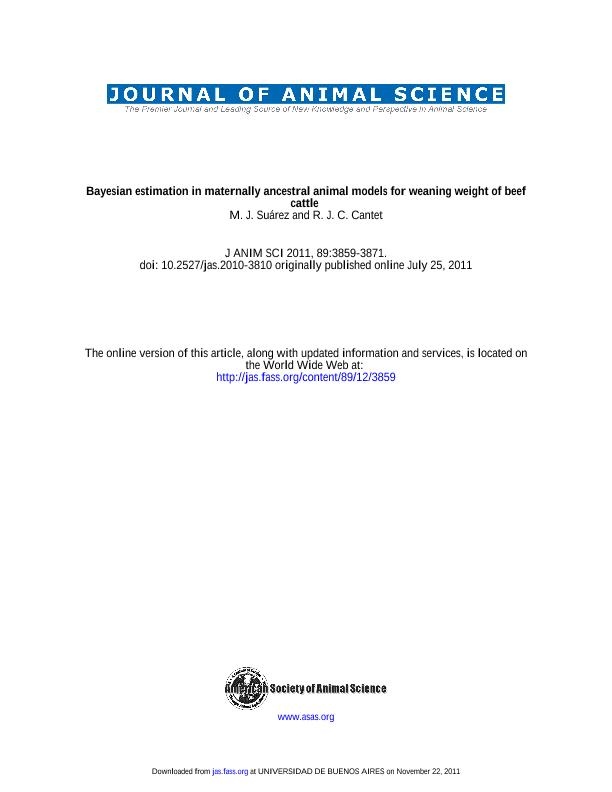Mostrar el registro sencillo del ítem
dc.contributor.author
Suárez, M. J.
dc.contributor.author
Cantet, Rodolfo Juan Carlos

dc.date.available
2017-04-25T19:36:13Z
dc.date.issued
2011-12
dc.identifier.citation
Suárez, M. J.; Cantet, Rodolfo Juan Carlos; Bayesian estimation in maternally ancestral animal models for weaning weight of beef cattle; American Society Of Animal Science; Journal Of Animal Science; 89; 12; 12-2011; 3859-3871
dc.identifier.issn
0021-8812
dc.identifier.uri
http://hdl.handle.net/11336/15720
dc.description.abstract
The Bayesian approach was implemented for fitting several maternally ancestral models for weaning weight data of Angus calves. The goal was to evaluate to what extent genetic evaluation models with additive grand maternal effects (G), or with an ancestrally structured covariance matrix for maternal environmental effects (E), or with a sire × year interaction (ISY), or combinations thereof (GE, GSY, ESY, GESY), redistribute the additive variability and reduce the negative magnitude of the additive correlation between direct and maternal effects (rAoAm), when compared with the regular maternal animal model (I). All animals with records had known dams and maternal granddams. The sampling scheme induced low autocorrelations among all variables and tended to converge quickly. The signs of the estimates of rAoAm were consistently negative for all models fitted. The magnitudes of the estimates of rAoAm from models E, G, GE, ESY, and GESY were almost one-third of those from models I and ISY. Inclusion of the sire × year interaction had some effect in reducing the negative magnitude of rAoAm, but also reduced the size of the estimates of direct (ho 2) and maternal ( hm 2) heritabilities. In comparison, models E or G reduced the negative magnitude of rAoAm by 0.50 units and produced more favorable estimates of ho 2 and hm 2 than models I and ISY. The estimate of ho 2 from G was similar to the one from I; however, the estimated hm 2 was 0.04 units greater, whereas the estimate of rAoAm was much less negative (−0.21 vs. −0.71) than the respective estimates from I. The environmental correlation between the weaning weights of dams and their daughters (λ) was estimated to be −0.28 ± 0.03 in E and ESY, and −0.21 ± 0.03 in GE and GESY. Inclusion of the sire × year interaction effect by itself did not have much of an impact in the reduction of the estimated magnitude of rAoAm. Rank correlations among EBV for direct effects were larger than 0.94 and did not show any appreciable difference among models, whereas the rank correlation among maternal breeding values displayed differences in the ranking between I and the other models. Models E and ESY recovered the largest amount of total additive variability with maternal effects.
dc.format
application/pdf
dc.language.iso
eng
dc.publisher
American Society Of Animal Science

dc.rights
info:eu-repo/semantics/openAccess
dc.rights.uri
https://creativecommons.org/licenses/by-nc-sa/2.5/ar/
dc.subject
Bayesian Estimation
dc.subject
Beef Cattle
dc.subject
Grand Maternal Additive Effects
dc.subject
Maternal Effects
dc.subject.classification
Otras Producción Animal y Lechería

dc.subject.classification
Producción Animal y Lechería

dc.subject.classification
CIENCIAS AGRÍCOLAS

dc.title
Bayesian estimation in maternally ancestral animal models for weaning weight of beef cattle
dc.type
info:eu-repo/semantics/article
dc.type
info:ar-repo/semantics/artículo
dc.type
info:eu-repo/semantics/publishedVersion
dc.date.updated
2017-04-24T20:42:10Z
dc.journal.volume
89
dc.journal.number
12
dc.journal.pagination
3859-3871
dc.journal.pais
Estados Unidos

dc.journal.ciudad
Savoy
dc.description.fil
Fil: Suárez, M. J.. Universidad de Buenos Aires. Facultad de Agronomia. Departamento de Producción Animal. Cátedra de Mejoramiento Genético Animal; Argentina. Consejo Nacional de Investigaciones Científicas y Técnicas; Argentina
dc.description.fil
Fil: Cantet, Rodolfo Juan Carlos. Consejo Nacional de Investigaciones Científicas y Técnicas; Argentina. Universidad de Buenos Aires. Facultad de Agronomia. Departamento de Producción Animal. Cátedra de Mejoramiento Genético Animal; Argentina
dc.journal.title
Journal Of Animal Science

dc.relation.alternativeid
info:eu-repo/semantics/altIdentifier/url/https://www.animalsciencepublications.org/publications/jas/articles/89/12/3859
dc.relation.alternativeid
info:eu-repo/semantics/altIdentifier/doi/http://dx.doi.org/10.2527/jas.2010-3810
Archivos asociados
